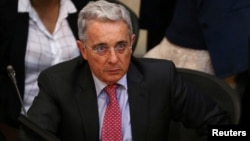It was always very personal.
Since stepping down as president six years ago, Alvaro Uribe has relentlessly condemned the policies of his handpicked successor-turned-foe and chiseled away at support for his biggest goal: ending the war with Marxist rebels.
On Sunday, the hardline senator scored his biggest victory yet against President Juan Manuel Santos, turning what seemed like certain victory for a peace deal with the Revolutionary Armed Forces of Colombia, or FARC, into a massive blow to the government.
Colombians' narrow rejection of the peace accord in a referendum shocked the world. It also pushed Uribe back onto center stage and in pole position for his political movement to win the 2018 presidential election.
The 64-year-old former cattle rancher from Colombia's tough western city of Medellin served two terms in office and is barred from seeking a third.
But he could well play kingmaker in 2018 as he did in 2010 with Santos, his former friend and defense minister. He has not yet said who he will back at the next election.
The peace accord envisaged FARC rebels handing over their weapons to the United Nations, confessing to their war-time crimes and forming a political party.
But Uribe, who scored major military gains against the FARC when he was president, led the "No" camp since Santos began the peace talks in 2012. He described them as far too lenient on rebel leaders and a national embarrassment.
He accused his former ally of selling out Colombians by promising congressional seats instead of prison cells to rebel leaders in return for ending a 52-year-old conflict that has killed more than 220,000 people.
Uribe mobilized millions of Colombians against the peace deal, even marching through the streets of Cartagena as international notables applauded its formal signing last week.
A former lawyer who spent time at Oxford University, Uribe may now be determinant in whether the war ends in a negotiated settlement or continues on the battlefield.
Offering a slight window to talks, Uribe on Sunday said he does want peace, but demanded that the deal be "corrected."
He will likely want some form of representation at any future talks and almost certainly would not accept anything less than some form of confinement for rebel leaders.
"Colombia gave a very strong message to Santos and the FARC last night, things have changed, so this can now be the start of a really good negotiation," Francisco Santos, Uribe's former vice president, told Reuters.
"Knowing Uribe, he will want to contribute, but this will not be a photo op, it will be a real negotiation," added Santos, who is the president's cousin but a member of the opposition.
Uribe's Democratic Center party, whose slogan is "Firm Hand, Big Heart", said on Monday it is willing to meet the government to seek a way forward.
SANTOS 'BETRAYAL'
Santos, 65, who was not obliged by law to hold a plebiscite, took a risk with the vote and now he may need Uribe to put the peace process back on track.
He had said there was no Plan B and failure to clinch support would mean returning to war with the FARC but on Sunday he said he would now consult with all sides and vowed to "keep seeking peace until the last minute of my term."
He plans to meet with political allies and opponents in Colombia and send peace negotiators back to Havana to speak to the FARC leadership.
If talks collapse, it could mean a return to war and the bombing campaigns that were central to Uribe's U.S.-backed counter-insurgency strategy when he was president.
"The great winner was Uribe; his presidential candidate is now positioned in first place for the 2018 election," said leftist Senator Antonio Navarro Wolff, a former rebel with the M-19 insurgent group that demobilized in 1990.
As president, Uribe's fierce military campaign against the FARC at times appeared to border on a personal vendetta. His father was killed by the rebels in a botched kidnapping and some Colombians believe he will only be content if the FARC is crushed on the battlefield.
Things certainly got personal with Santos, who as his defense minister masterminded anti-FARC offensives but later "betrayed" him in Uribe's eyes.
In angry Twitter posts, Uribe accused Santos of using him to get into office in 2010 by promising to continue hard-line policies - only to secretly prepare peace talks.
Elected to the Senate in 2014, Uribe's populist appeal has kept him in the spotlight while most other former presidents slink off into retirement.
He has a fiery temper and used to publicly scold military generals for battlefield defeats, a governing style that contrasts with the calm, diplomatic Santos.
Uribe left office with high approval ratings but his legacy was tainted by accusations of corruption and of wire tapping opposition politicians and journalists.
His party, while attracting some well known politicians, is essentially a one-man show with Uribe defining its policies. He would almost certainly have significant clout behind the scenes if his chosen candidate won the 2018 election.





